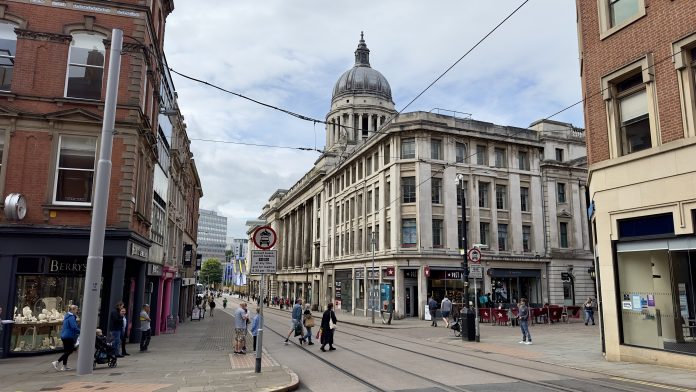
© westbridgfordwire.com
Nottingham City Council has successfully secured a grant of £631,374.47 from the Department for Transport (DfT) to address outdated traffic signals.
The funding, part of the national Traffic Signals Obsolescence Grant (TSOG), will be used to phase out older halogen incandescent lamps and replace them with energy-efficient LED modules.
The project, scheduled to begin in April 2024 and conclude by March 2026, aims to reduce energy costs, carbon emissions, and maintenance costs associated with the ageing signal systems.
The total grant is composed of £500,000 obtained through a competitive challenge fund application and an additional £131,374.47 automatically allocated to Nottingham City Council.
These funds will be directed towards upgrading approximately 48% of the city’s traffic signals, which currently use halogen incandescent (HI) lamps. These older lamps, known for their high energy consumption and frequent maintenance requirements, will be replaced with modern LED retrofit signal heads.
The switch to LED technology is expected to deliver significant benefits. The new modules consume just 9 watts per cycle, representing a 75% reduction in energy use compared to the current HI lamps. Furthermore, LED modules have a much longer lifespan, which will drastically reduce the frequency of replacements and the associated downtime.
The project is anticipated to yield substantial cost savings for the council, with a projected annual reduction of £118,000 based on previous upgrades. The transition to LED signals is also expected to reduce the carbon footprint of Nottingham’s traffic signal network by approximately 78% per lamp. These savings are crucial as the council seeks to manage financial pressures while contributing to its broader sustainability goals.
In addition to the financial and environmental benefits, the upgrade will also address operational reliability. The LED signals are less prone to faults, reducing the number of failures and maintenance interventions required, thus improving traffic flow and safety across the city.
The delivery of this upgrade will be managed by Nottingham City Council’s Traffic Control Centre, which will oversee the maintenance contractor responsible for carrying out the installations.
Regular progress and budget reports will be submitted to both the DfT and the City Council’s Transport Delivery Board for oversight. This monitoring process mirrors the reporting structure currently in place for the Transforming Cities Fund 2 (TCF2), which also focuses on traffic signal improvements.
This funding comes at a critical time, as halogen incandescent lamps are being phased out nationally, and manufacturers are discontinuing production. Nottingham’s current reliance on HI lamps, which power nearly half of its traffic signals, makes the city particularly vulnerable to obsolescence issues. The TSOG funding ensures that Nottingham can keep pace with modernisation efforts while retaining much of its existing infrastructure, minimising waste and ensuring a sustainable transition.
Rejecting the funding was considered but dismissed as it would have required the council to divert its own limited resources to address the looming obsolescence. Instead, the TSOG grant will allow Nottingham to maintain and enhance its traffic signal infrastructure without imposing additional financial strain on the city’s budget.
TrendForce 2024 Global LED Lighting Market Analysis
Release Date: 01 February 2024 / 31 July 2024
Language: Traditional Chinese / English
Format: PDF and Excel
Page: 90-100 / Semi-Annual
|
If you would like to know more details , please contact:
|












